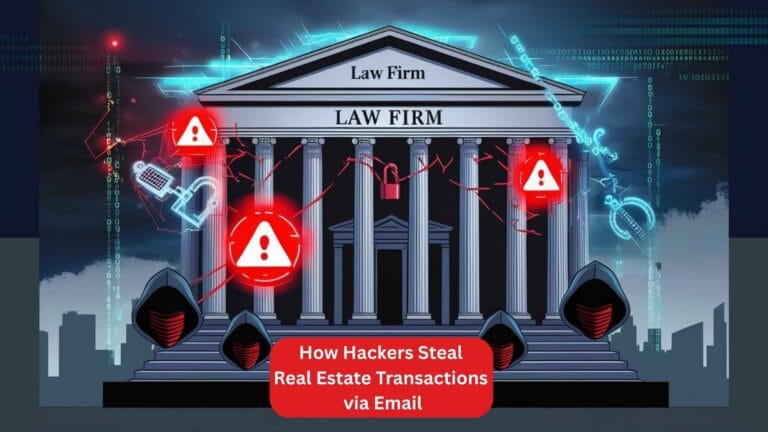Law firms are 400% more likely to suffer a cyberattack than other businesses, not because they’re careless, but because they’re goldmines of sensitive data. If you’ve ever thought, “We’re too small to be targeted,” this article will change your mind, and show you exactly how to lock down your firm’s digital defenses.
I’ve spent 12 years helping legal practices recover from breaches, and the pattern is always the same: Hackers view attorneys as “soft targets with hard cash.” Just last month, a 5-person estate planning firm lost $250,000 in a single afternoon to a spoofed vendor email. The worst part? It was 100% preventable. Let’s break down why law firms are bullseyes for cybercriminals, and how to fight back.
“We’re Just a Small Firm”: Here’s Why Hackers Disagree
Law firms are targeted because they combine three irresistible hacker magnets: sensitive data, financial liquidity, and often outdated IT systems.
The Deadly Trio of Legal Vulnerabilities
- Data Worth More Than Bitcoin
- Client files contain SSNs, bank accounts, trade secrets, everything needed for identity theft or corporate espionage.
- 2024 ABA Report: 43% of law firms store unencrypted client data on employee devices.
- Trust-Based Transactions
- Wire transfers and trust accounts move millions daily with fewer verifications than corporate banking.
- Real Case: A Florida real estate firm lost $687k to a hacker who impersonated a title company via a single typo (Chase v. Hackers LLC, 2023).
- Outdated Tech = Open Doors
- 61% of solo practices use Windows 10 or older (no security updates) (LegalTech Survey, 2025).
- Analogy: “Using Windows 7 in 2025 is like leaving your courthouse files in a bus station locker.”
Actionable Fix:
Conduct a free cybersecurity health check using the ABA’s Legal Cybersecurity Toolkit.
The Hidden Weakness: Your Staff’s “Helpful” Habits
Your team’s efficiency shortcuts are a hacker’s favorite backdoor.
Why “Just This Once” Hurts Most
- Shared Passwords: 58% of legal admins reuse passwords across firm/ personal accounts (Keeper Security, 2024).
- Email Overload: 92% of phishing attacks on law firms start with a fake “urgent” client or court email (Proofpoint, 2025).
- BYOD Dangers: That paralegal checking work email on their kid’s malware-infected tablet? Instant breach.
Client Story:
“We thought our VPN was secure, until a hacker entered through our office manager’s home computer. They’d saved the password in Chrome after working remotely.”
(Criminal defense attorney (post-breach interview))
Actionable Fix:
Implement mandatory password managers (like 1Password) and disable browser password saving.
Myth Debunked: “We Don’t Need Cybersecurity, We Have Insurance”
Cyber insurance is a safety net, not a forcefield, and claims are often denied for basic oversights.
The Fine Print That Stings
- 67% of legal cyberinsurance claims in 2024 were denied due to “failure to implement basic safeguards” (Insurance Journal).
- Most policies don’t cover:
- Reputational harm
- Client lawsuits over data exposure
- Ransom payments (now illegal under 2025 U.S. Treasury rules)
Analogy:
“Counting on cyberinsurance without MFA is like expecting flood insurance to pay for leaving your windows open in a hurricane.”
Actionable Fix:
Audit your policy with this ABA Insurance Checklist.
90-Day Security Overhaul: A Lawyer’s Step-by-Step Guide
Phase 1: Lock the Doors (Week 1-2)
Enable Multi-Factor Authentication (MFA) on all accounts (even the intern’s). Microsoft Authenticator or Yubikeys work best.
Segment your network: Put trust accounts on a separate VLAN (ask your IT pro, it takes 20 minutes).
Phase 2: Train Your Human Firewall (Month 1)
Run simulated phishing tests: Services like KnowBe4 send fake “urgent client emails” to train staff.
Adopt the “3-Click Rule”: If an email demands action, verify via phone before clicking anything.
Phase 3: Prepare for the Inevitable (Month 3)
Create a breach response kit: Template letters for clients, regulators, and courts (download the ILTA’s free kit).
Designate a “Breach QB”: One partner who makes crisis calls when the IT team says, “We’ve been hacked.”
The Bottom Line: Security Is Your New Billable Hour
Every minute spent on cybersecurity now saves 40+ hours of breach triage later. The good news? You don’t need to become a tech expert, just a vigilant steward of your firm’s digital safety.
Final Thought:
“In 2025, clients won’t ask if you’ve been hacked, they’ll ask when and how you protected them.”
Need Help Now?
- Free Resource: FBI’s Law Firm Cybersecurity Guide





